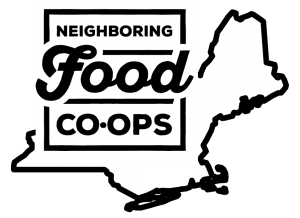 Your Neighboring Food Co-ops
Your Neighboring Food Co-ops
Locally Owned by More Than
160,000 People Like You!
In this Month’s E-News, check out:
- Growing a More Sustainable Future
- Congresswoman Chellie Pingree Digs Co-ops
- Co-op Webinar Series: The Legacy of Rochdale
- 10th Anniversary Partner Profile: Nationwide
- Cave to Co-op Artisan Cheese: Eidolon
- Farm to Freezer & Earth Day
- Farmers Union: Food Safety for Small Processors
- Co-op Calendar: Up & Coming Food Co-op Conference
Growing a More Sustainable Future
Food is at the center of building a more sustainable future for everyone, and your local co-op is a great place to make a difference this Earth Day and every day.
April 22 is International Mother Earth Day and the United Nations (UN) is inviting people around the world to take action on the Sustainable Development Goals (SDGs). Approved by the UN General Assembly in 2015, the SDGs are a blueprint to achieve a better and more sustainable future for everyone by 2030. With the global impacts of the pandemic and the urgent need for action on climate change, we all have something to contribute.
to take action on the Sustainable Development Goals (SDGs). Approved by the UN General Assembly in 2015, the SDGs are a blueprint to achieve a better and more sustainable future for everyone by 2030. With the global impacts of the pandemic and the urgent need for action on climate change, we all have something to contribute.
The UN’s ACT NOW campaign focuses on 10 easy ways that we can make a difference every day, like bringing your own shopping bag, reusing containers, choosing local produce, and making plant-based meals. We can also advocate for government policies supporting food security, environmental protection, and participation in UN efforts to combat climate change.
At your local food co-op, you are working with your neighbors to create change together, strengthening food security, building a more inclusive economy, and growing ecological sustainability. For example, almost 30% of sales at your Neighboring Food Co-ops are sourced from local producers. You can also find organic products that support healthy soils, buy in bulk to help reduce packaging waste, and “Go Co-op” by choosing products from co-ops that empower workers and producers. Together, co-op members are supporting Healthy Food Access programs that are making healthy food and co-op membership more accessible and contributing to community organizations through round up at the register efforts.
During the month of April, your Neighboring Food Co-ops are sharing some of the ways that co-op members are working together to work to build a better future for everyone, including:
- Brattleboro Food Co-op in VT developed an Earth Day, Every Day list of tips on reducing food and packaging waste, and is offering an online workshop on “Your Food Choices & Climate Change.”
- City Market/Onion River Co-op in VT will be giving away 25,000 free reusable bags during Earth Week, an annual event at the Co-op!
- Cambridge Food Co-op in NY is hosting a Road Side Clean-up event organized by their Membership and Community Outreach Committee.
- Fiddleheads Food Co-op in CT is promoting city and regional events supporting gardening and agriculture, like the City of New London’s Community Gardening program.
- Franklin Community Co-op in MA is encouraging people share how they green their routines and be entered to win “Green Your Routine” environmentally friendly products.
- GreenStar Food Co-op in NY is encouraging people to celebrate Earth Month by shopping in our Bulk Department and purchasing bulk offerings in its Wellness Department in order to reduce waste. They’ve developed an easy and colorful 3-step guide on how to shop Bulk.
- Middlebury Food Co-op in VT have partnered with Eos Botanicals to provide shoppers with a 20% discount on all Eos products for the month of April. Eos Botanicals is donating 10% of the total sales to United Plant Savers, whose mission is to protect native medicinal plants of the US and Canada and their native habitat, and the co-op is matching the donation.
- River Valley Co-op in MA is having their Round Up for Change at the register go to Co+op Forest a program that plants trees in previously deforested regions of the Peruvian Amazon.
- Springfield Food Co-op in VT is featuring their 1st Annual Earth Day Raffle to celebrate and reward those who volunteers through service or advocacy for an environmental cause. Nominations are being accepted between April 1 and April 20 with winners being announced on Earth Day.
- Urban Greens Co-op Market in RI has launched a new composting initiative, making it easier for shoppers to compost their own food waste, and purchase locally made finished compost.
- Wild Oats Co-op Market in MA featured organization for their “Round Up For Change” program this month is Hoosic River Watershed Association, $2,500+ are raised through Round Up monthly.
The Seventh Co-operative Principle, Concern for Community, calls on co-ops and the members around the world to “work for the sustainable development of their communities.” As democratically governed, community-based businesses, co-ops are designed to meet member needs and goals rather than maximizing short-term profits and are able to focus on social and environmental priorities through their purchasing priorities, operational practices, and community education activities. Through its “Co-ops for 2030” campaign, the International Co-operative Alliance has committed the movement to supporting the United Nations’ Sustainable Development Goals (SDGs), which seek to build shared peace and prosperity for people and the planet, now and into the future.
When you shop at your local food co-op, you are helping to build a more inclusive economy and stronger, more resilient and sustainable community. And as a co-op member, you are part of a movement of more than one billion co-operators around the world working to build a better world for everyone.
Find a food co-op near you: https://nfca.coop/members.
Congresswoman Chellie Pingree (ME) Digs Co-ops
Congresswoman Chellie Pingree was a special guest at the NFCA’s 10th Annual Meeting, sharing her thoughts on the role of food co-ops in building regional food security.
Representative Pingree, a national leader in food policy representing Maine’s 1st District, started her 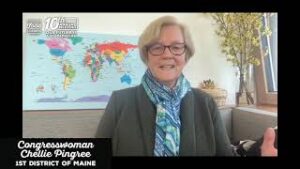 career as an organic farmer in the 1970s and has been engaged in food system reform ever since. She shared her remarks at the Neighboring Food Co-op Association’s 10th Annual Meeting, held online on March 21st, 2021.
career as an organic farmer in the 1970s and has been engaged in food system reform ever since. She shared her remarks at the Neighboring Food Co-op Association’s 10th Annual Meeting, held online on March 21st, 2021.
“Co-ops have been as important or more important in this past year than ever… So many things that are integral to food co-ops are really the kinds of things we need,” said Pingree. “I was particularly pleased to read that about a third of the food at your co-ops is locally procured, which I think is really quite amazing. Even if it was only half that it would be amazing because your average grocery store has only two to three percent locally grown food.”
The NFCA’s 10th Annual Meeting and recordings of the proceedings were made possible by generous supporters including CoBank, Cabot Creamery Co-op, Local Food Safety Collaborative, Nationwide, National Cooperative Bank (NCB), and New England Farmers Union.
To view Congresswoman Pingree’s full remarks, visit the Neighboring Food Co-ops YouTube Channel.
Co-op Webinar Series: The Legacy of Rochdale
Working People and Business Owners. Weavers and Socialists. Democracy Activists and Abolitionists.
Check out the latest installment in the National Farmers Union (NFU) Co-op Webinar Series: “Rochdale & The Early Co-operative Movement.”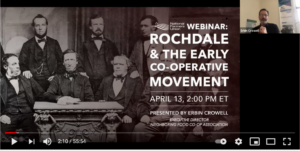
Over 170 years ago, a small group of people founded a humble grocery co-op in the North of England with an ambitious vision for a better world. Building on earlier experiments in co-operative enterprise, their ideas soon spread around the world, complementing local struggles, traditions, practices of mutual aid to help inspire what became an international movement for economic democracy. What became known as the Rochdale Principles were taken up by groups such as the National Farmers Union, forming the basis for organizing successful agricultural co-ops, and other organizations focused on their adaptation to consumer, worker and other co-operative models.
In this webinar, Erbin Crowell, Executive Director of the Neighboring Food Co-op Association and Chair of the National Cooperative Business Association discusses the origins of the Rochdale Society of Equitable Pioneers, the challenges that they were trying to address, and how their legacy remains relevant today. Resources for further study are also included.
This webinar is part of a series being developed by Crowell for NFU as a resource for education and participation in the cross-sector co-operative movement. Topics include co-operative history, growth and development, and relevance to contemporary issues.
“The purpose of this webinar and the other co-op sessions we host throughout the year,” said Emma Lindberg, NFU Education Director, “is to share more information about NFU’s co-operative legacy, encourage involvement in co-ops, and to answer your questions about co-ops.”
To view this and other webinars in the series, please visit the National Farmers Union YouTube Channel.
10th Anniversary Partner Profile: Nationwide
Nationwide, a Fortune 100 company based in Columbus, Ohio, and one of the largest and strongest diversified insurance and financial services organizations in the United States, was founded on co-operative principles by farmers with the Ohio Farm Bureau in 1926.
Murray D. Lincoln, Nationwide’s president from 1939-1964, was one of the world’s best-known co- operative leaders and was a dynamic spokesman for co-ops in every sphere. (This portrait hangs in the Murray D. Lincoln Campus Center at UMass Amherst.)
operative leaders and was a dynamic spokesman for co-ops in every sphere. (This portrait hangs in the Murray D. Lincoln Campus Center at UMass Amherst.)
“People have within their own hands the tools and the power to fashion their own social and economic destinies,” said Lincoln in his book, Vice President in Charge of Revolution, “if they will only organize themselves to use them.”
Born on a family farm in Massachusetts and a graduate of the Massachusetts Agricultural College (now the University of Massachusetts, Amherst), Lincoln also served as President of the National Cooperative Business Association, CLUSA International, and on the board of the International Co-operative Alliance (ICA).
Lincoln’s legacy and tradition of Nationwide’s support of co-operatives continues to this day. Devin Fuhrman, vice president of sponsor relations at Nationwide, stressed the importance of these connections to the company’s past and future:
“Lincoln was truly a visionary leader in the co-operative business model internationally and Nationwide remains deeply supportive today of organizations like the Federation of Southern Cooperatives, that help ensure that all voices are represented in agriculture and co-operatives,” Fuhrman said. “Food and co-operatives are where our roots began and we’re proud to be a sponsor of the 10th Annual Meeting of the Neighboring Food Co-op Association.”
Nationwide has two large agricultural co-operatives as sponsors – CHS, Inc. and Southern States Cooperatives. Nationwide has also been a leader in workplace diversity, receiving a 100% rating from Corporate Equality Index every year since 2004, and is a long-time supporter of the Federation of Southern Cooperatives Land Assistance Fund.
“As we work to rebuild our economy, people are looking for alternatives that put more power in their hands. Working together, co-ops and mutuals have an opportunity to share a proven solution: the co-operative business model,” said Erbin Crowell, executive director of the Neighboring Food Co-op Association. “We’re so appreciative of Nationwide’s support as we celebrate 10 years and look forward to future collaboration as we build a more inclusive economy.”
For more information on Nationwide, please visit www.nationwide.com.
Cave to Co-op Artisan Cheese: Eidolon
Eidolon, Grey Barn, Chilmark, Martha’s Vineyard, MA
Eidolon is a certified organic, pasteurized cow’s milk cheese with a bloomy rind. 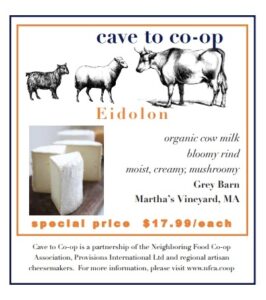
This cheese takes its name from the Walt Whitman poem “Eidolons:” an Eidolon is an object’s perfect form; it’s an ideal, almost unattainable. For Grey Barn, that perfect form has always been a cheese that captures the heart of the farm: one that packs a taste you could produce unique only to Martha’s Vineyard. Instead of a standard brine, they hand-salt and dry the Eidolon after they’ve been drained into their cylindrical form. The starter cultures in Eidolon naturally bloom over time, forming the soft and delectable white rind that distinguishes the Eidolon and other “bloomy-rinds.” Just under the white bloom is a soft paste with a cake-like center.
The Grey Barn Farm in Chilmark started with just three cows in 2009; now there are 40 Dutch Belted ladies grazing the fields, as well as pigs, sheep and chickens. If you visit Martha’s Vineyard be sure to stop by Grey Barn’s bakery. They bake bread daily to go with their award-winning cheeses.
The folks at Grey Barn suggest serving Eidolon with crisp green apple, light honey and toasted bread. Switching the apple and honey for a favorite marmalade makes Eidolon a delicious breakfast treat. And with an acidic vinaigrette, Eidolon makes a wonderful salad topping. Or try one of the recipes on our April Cave to Co-op page.
Each month our Cave to Co-op partnership between Provisions International and the Neighboring Food Co-op Association (NFCA) offers a delicious regional cheese featured at a great price. Strengthening our local and regional farmers and producers by supporting artisanal cheesemakers is a key goal of the Cave to Co-op program.
April is Earth Day month–a great time to commit to working together to support family farms in being more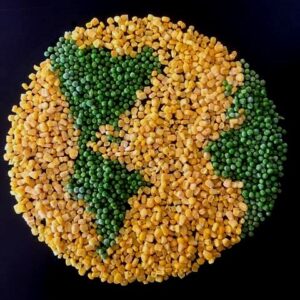 sustainable, and working toward a more sustainable regional food system.
sustainable, and working toward a more sustainable regional food system.
Earthday.org estimates that more than 1 billion people in 192 countries now participate in Earth Day activities each year, making it the largest civic observance in the world. Every year on April 22, Earth Day marks the anniversary of the birth of the modern environmental movement starting in 1970. From student organizing to community-wide, from individual actions to officials in government there are countless ways for anyone to make a difference and celebrate Earthday. Earthday.org has suggested lists to inspire action and a way to share your own great action idea.
One great way to have an impact is to increase the amount of regionally-produced foods you eat which reduces transportation and results in a lower carbon and ecological foot print. By purchasing local and regionally-grown food we can make an impact individually and collectively through our food co-ops. While we wait for fresh Peas, Corn and Blueberries grown in our region we can enjoy NFCA frozen and keep supporting family farmers year ‘round.
Your food co-ops work hard to support our local farmers, and we are proud to be working together with other food co-ops across our region to make regionally grown produce available throughout the year. Eat healthy and support family farmers throughout the year and celebrate Earth Day every day with delicious produce from our region. Look for our Northeast Grown Frozen Fruits and Vegetables in the freezer section. They’re easy to find because they’re packed in a clear package so you can see what’s inside!
For more Farm to Freezer information and recipes — including a frittata recipe great for spring family celebrations using frozen corn or peas — visit: www.nfca.coop/farmtofreezer.
Farmers Union: Food Safety for Small Processors
Many small-scale farms and food businesses — whether they are chopping, canning, preserving, aggregating, or dehydrating value-added products — might not know where to begin when navigating the Preventive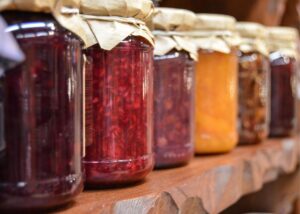 Controls Rule (PCR) of the Food Safety Modernization Act (FSMA).
Controls Rule (PCR) of the Food Safety Modernization Act (FSMA).
While many of these small processors may be exempt from parts of the rule, they still must comply with Current Good Manufacturing Processes (cGMPs). CGMPs are the foundation for a food manufacturer—no matter their size—to successfully minimize food safety risks and build a strong business. Finding right-sized resources to help small producers understand and apply cGMPs can be difficult, as traditional courses that teach Preventive Controls principles are more complex and expensive than most small processors making low-risk foods need or can afford.
Following Good Manufacturing Processes is more than just a legal requirement; it’s just plain good business sense. Implementing food safety practices can help build trust with customers, streamline production flow, and ensure a strong base for an operation to scale up as it grows. If you’re a farm or small food business making value-added products, visit the Local Food Safety Collaborative website along with the Food Safety Resource Clearinghouse for a curated source of food safety guides, factsheets, templates, and more. Don’t forget to follow us on Facebook and Twitter for updates on the latest food safety news.
This project website is supported by the Food and Drug Administration (FDA) of the U.S. Department of Health and Human Services (HHS) as part of a financial assistance award 1U01FD006921-01 totaling $1,000,000 with 100 percent funded by FDA/HHS. The contents are those of the author(s) and do not necessarily represent the official views of, nor an endorsement, by FDA/HHS, or the U.S. Government.
Locally, farmers and small value-added producers can also contact Roger Noonan, New England Farmers Union President and NH Organic Farmer, for guidance and resources. Roger will also offering a workshop at the NOFA Summer Conference for organic producers. For more information, visit https://newenglandfarmersunion.org.
(This article was adapted from an original piece by Tricia Wancko, Food Safety Grant Coordinator at National Farmers Union.)
Our Local Farmers & Fishermen Need You!
Do you care about where your food comes from and want to support the people who produce it? Join the NEFU as a Friend of the Farmer for just $15. Your membership will help ensure that our region’s producers and consumers are heard by policy makers here at home and in Washington, DC. For more information, please visit www.newenglandfarmersunion.org.
Co-op Calendar: Up & Coming Food Co-op Conference
Join your Neighboring Co-operators at the Virtual 2021 Up & Coming Food Co-op Conference!
For More Co-op Events, Visit https://nfca.coop/calendar
The Neighboring Food Co-op Association (NFCA) is a co-operative federation of over 40 food co-ops and startup initiatives across New England, working together toward a shared vision of a thriving co-operative economy, rooted in a healthy, just, and sustainable food system and a vibrant community of co-operative enterprise.


